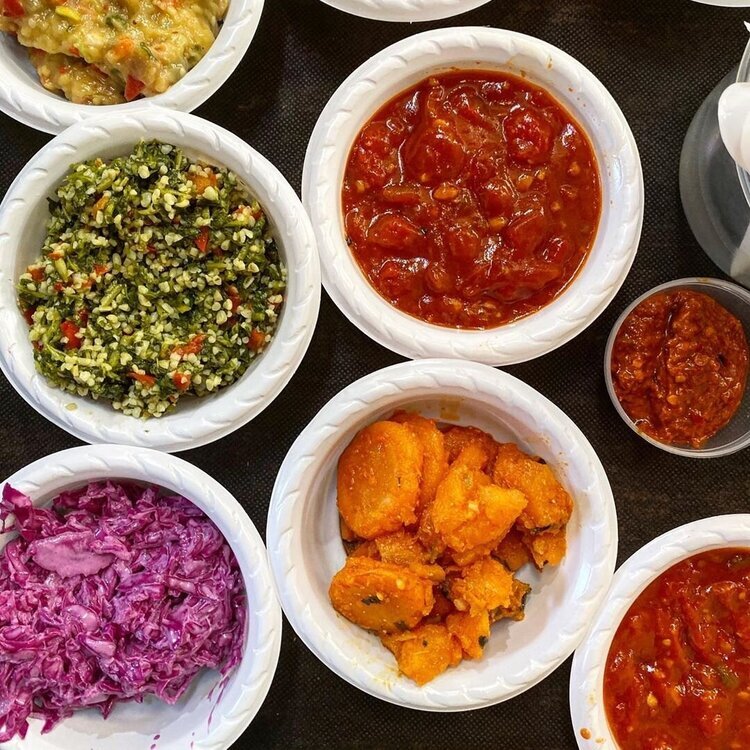This blog post was written by Delicious Israel intern Noa Cole, who we are so thrilled to welcome on board this summer! Check out her incredible creations on Instagram at @sweetstreatsothereats.
The 4th of July is a day worth nothing short of a full-on celebration. The United States’ birthday (a ripe old 244 this year!) is one of our favorite excuses to be (while doing so safely and keeping enough distance) outside with family and friends, especially after so long cooped up in our houses. The 4th of July signifies everything we love about the summer season: outdoor activities, daylong get-togethers and poolside fun with cool drinks in hand. But perhaps the most important of all is that treasured barbecue event. While we love a classic American barbecue, the same foods can get old pretty quickly. The good news is that Israelis love to barbecue (our Independence Day, Yom Ha’atzmaut, is celebrated much like July 4th!) and can teach even the most patriotic Americans a thing or two about barbecuing right. Here are some simple ways to Israelify your 4th of July celebrations, because isn’t mixing cultures what America is really all about?
To Drink: Limonana
What goes better with barbecued meat than a glass of cool lemonade? Sweet and sour and completely refreshing, its the perfect thing to wash it down with. But why not have some fun and try something new? This year, try the Israeli version: limonana.
The Israeli version of lemonade is called limonana because it is a combination of the words limon (lemon) and nana (mint). This drink is actually green! The mint brings a beautiful vibrant color and a unique zing perfectly appropriate and enjoyable for adults. Try a regular version or a frozen version mixed up in a blender for extra fun. Feel free to add some arak and wash it all down!
Frozen limonana. Photo via The Nosher
Bread: Pita
Photo via Serious Eats
As carb-lovers, we aren’t exactly here to tell you to put down that white-bread bun. But we do have a great alternative or addition: pita. Pita gives a different sandwich experience without losing all the yummy aspects of a traditional bun.
Israeli-style barbecues—and sandwiches in general—almost exclusively use pita bread rather than buns. Warm and fluffy pita pockets are the all the best of all worlds. Not only are you still getting that soft, bread-like texture that elevates any piece of meat, you are also getting the PERFECT vessel. Unlike a normal hamburger or hot dog bun, a pita only has a small opening at the top, making stuffing your pocket full with condiments and toppings a breeze. It also maximizes socialization: instead of having to sit down hunched over a table (so your toppings don’t drip everywhere) the one-handed pita is the best party addition. You just stuff your pocket with barbecue galore, and you are ready to go! No table or plate to hold you back on this 4th of July.
For our exclusive Delicious Israel Shuk and Cook chef’s recipe for pita bread, click here.
Starters and Sides: Salatim
A typical Israeli spread of salatim
The classic American barbecue is known for its large, heavy sides and appetizers like potato salad, mayo-heavy coleslaw, mac and cheese, and French onion dip. These sides are DELICIOUS, but they often leave you feeling sluggish on top of all that meat, or you end up with a whole lot of beige on your plate.
Instead of overtaking the barbecued meat, the sides should help the meat shine. That is where Israeli salatim come in. In Hebrew, salatim (plural for ‘salad’) doesn’t just refer to boring lettuce salads like an American-trained ear might expect. Nope, instead salatim can be anything from salads, dips, spreads, and appetizers. Salatim focus on using fresh, seasonal ingredients that are the perfect bright addition to any barbecue spread. Think Moroccan matbucha, tabbouleh, spiced carrots, smoked eggplant dip, or onions pickled with sumac.
Click here for our blog post with more salatim recipes!
The Meat: BBQ Spice
Photo via Taste of Kosher
Israeli barbecue is allllll about the spices. While many American barbecues rely heavily (and this is not a bad thing!) on marinades and sauces, Israeli barbecue gets all its flavor from flavorful spice rubs that take the meat from average to AMAZING. The meat is your canvas and the spices are the art!
Now finding the perfect spice blend, much less making one isn’t an easy task, but don’t worry, I have the perfect blend for you! This blend is so popular in Israel and is commonly known as “Chicken Grill,” “BBQ Spice,” or, what we here at Delicious Israel like to call “Doritos Spice” for its uncanny resemblance to Doritos. And although this specific blend is mostly used on chicken, that doesn’t restrict its unlimited possibilities. While spice mixes such as this one are unique to the individual vendor that creates it, click here for a simple recipe of the spice mix that will put a great spin on your classic 4th of July barbecue. Simply coat your meat generously in the BBQ Spice and get grilling.
Sauces: Hummus, Tahini, Amba
Love the traditional condiments? I don’t blame you. There is something so classic, so Americana about good old ketchup, mayo, and mustard. I’m here to tell you that there are Israeli sauces that would make you completely forget about their traditional counterparts: hummus, tahini, and amba.
Hummus
Israeli hummus plate
Dare I say it: this year, try swapping out ketchup for hummus. Hear me out: hummus can pretty much go on anything. It is creamy, tangy, and so dang good on barbecue. This sauce can be found in so many different flavors and variations that you are bound to find on that is right for you. It offers that unique taste without losing any of the deliciousness that comes along with ketchup—well, except for all the added sugar.
Tahini
Photo via Inspired Taste
Tahini (sesame paste) is a perfect heart-healthy substitute for heavy mayos and creams. Tahini is popular in Israel for many reasons, but one of the most important ones is its versatility. Tahini is smooth, creamy, and offers a slight nuttiness from the sesame seeds, and in Israel is so often used to replace creamy dairy sauces because of kosher laws. This combination adds a great depth of flavor to any dish. The toasty flavor that tahini presents is yet another way to elevate traditional barbecue, and we love mixing it with our next sauce: amba.
Amba
Photo via What Jew Wanna Eat
Never heard of amba? You’re not alone! This Indian-Iraqi-Israeli fermented mango sauce is an Israeli culinary delight that is yet to have its big day in America, but can easily be made at home or purchased on Amazon.
This year, try replacing mustard on your hot dog with amba sauce. Traditional amba often has mustard seeds as part of its blend of spices, so this works perfectly! The sharp acidity found in mustard is often used as a way to break up sweetness found is barbecue. Amba easily matches this use, if not surpasses it. While it may sound strange, this sauce- a tangy mango pickle condiment- has a remarkable flavor profile, with the sweet, sour and spicy mango all working together in harmony. Go the unexpected route this 4th and give your guests a sauce that they won’t forget.
SOMETHING EXTRA: ISRAELI WATERMELON-FETA-MINT SALAD
Photo via Tori Avey
Does any fruit better symbolize the 4th of July than watermelon? At my house, no celebratory barbecue is complete without a juicy, ripe watermelon to finish off the perfect meal. While I must admit, the classic pieces of watermelon are great on their own, I have a way to make this fruit even better: make it into a watermelon salad. No, this isn’t a salad with lettuce like you think, this salad purely consists of three main ingredients: watermelon, Feta cheese, and mint. Sound weird to you? Trust me here: this is GOOD. Israelis particularly love to eat it on the beach, making it perfect for a barbecue like this.
It is super refreshing and the mix of the sweet watermelon with the salty Feta is ideal and balanced. I love adding a drizzle of balsamic glaze on top of this salad to add another layer of flavor, but this dish has so much room for you to put your own spin on it. This spin on a classic is yet another way to bring a piece of Israel into your 4th of July celebration. Check out Tori Avey’s recipe for this great salad here.
The 4th of July is the epitome of summer. With these Israeli twists on old classics, I guarantee that your barbecue will be the talk of the town!
If you want to learn some summer cooking with private virtual classes, check out Delicious Experiences!
Wishing everyone a happy, safe, and healthy 4th of July!









